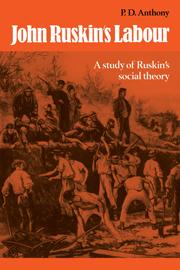2 - Justice and authority
Published online by Cambridge University Press: 07 October 2011
Summary
‘I am, and my father was before me’, wrote Ruskin, ‘a violent Tory of the old school; – Walter Scott's that is to say, and Homer's.’ His toryism implied ‘a most sincere love of kings, and dislike of everybody who attempted to disobey them’. This assertion or boast on Ruskin's part contrasts oddly with his reputation as a radical. He was no libertarian. The general submission of all things to the law of God meant that liberty was ‘a treacherous phantom … there is no such thing in the universe. There can never be. The stars have it not; the earth has it not; the sea has it not; and we men have the mockery and semblance of it only for our heaviest punishment.’ Any revolutionary notion of freedom from authority was contradictory nonsense, a prescription for disaster and an explanation of current disorder in society. Ruskin was horrified by libertarian doctrine whether he found it among the sansculottes or the economists whose doctrine of let alone conceived ‘the proper state of the world to be simply that of a vast and disorganized mob, scrambling each for what he can get, trampling down its children and old men in the mire’. Either conception of liberty stemmed from an arrogant misconception of man as standing above God's dominion over nature.
If ideas of liberty were a delusion, ideas of equality were a mistake. Equality amongst men is impossible because of the obvious superiority that some men have over others in terms of strength (the original explanation of landowning, the exercise of that superiority in robbery) and ability. These more obvious differences are accompanied by differences in wisdom and moral quality.
- Type
- Chapter
- Information
- John Ruskin's LabourA Study of Ruskin's Social Theory, pp. 29 - 44Publisher: Cambridge University PressPrint publication year: 1984



